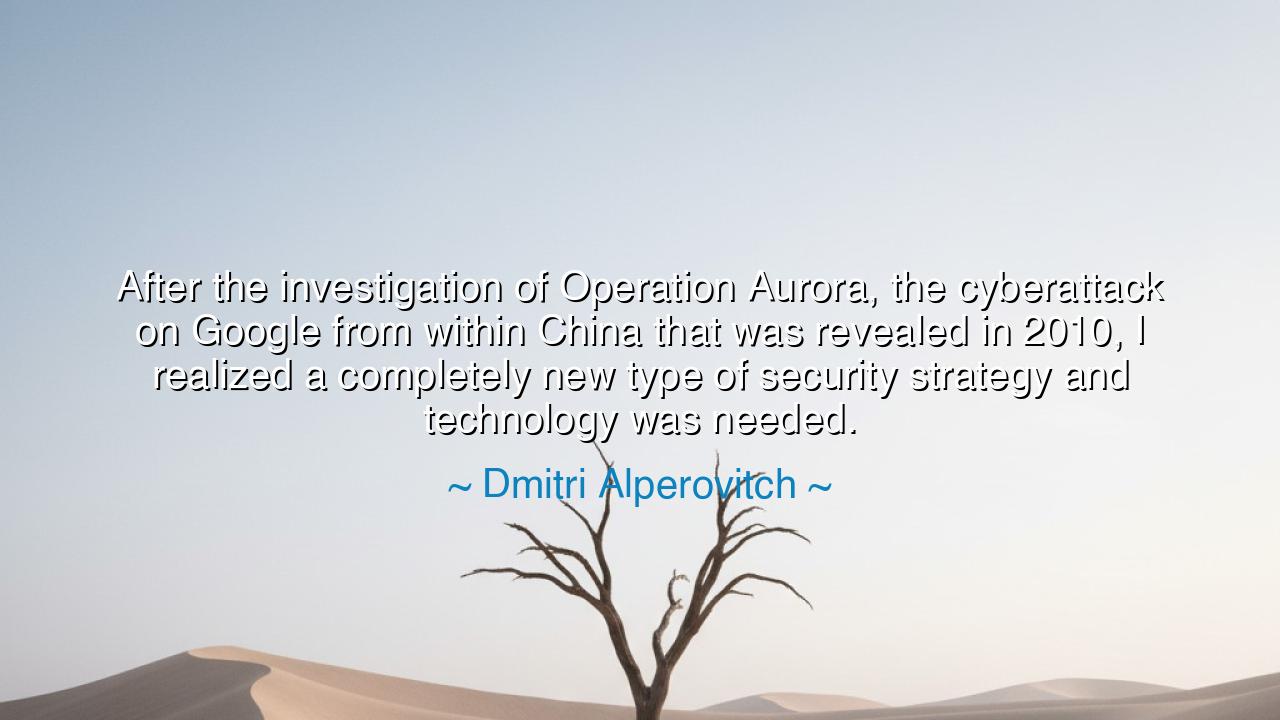
After the investigation of Operation Aurora, the cyberattack on
After the investigation of Operation Aurora, the cyberattack on Google from within China that was revealed in 2010, I realized a completely new type of security strategy and technology was needed.






Hear the words of Dmitri Alperovitch: “After the investigation of Operation Aurora, the cyberattack on Google from within China that was revealed in 2010, I realized a completely new type of security strategy and technology was needed.” In this utterance is not only the account of a digital battle, but a revelation about the shifting nature of power and protection in the modern age. For where once the walls of stone and steel guarded kingdoms, now invisible wars rage across wires and codes, demanding new forms of vigilance, new shields, and new swords.
Operation Aurora was no ordinary act of sabotage. It was the herald of a new kind of conflict, where unseen adversaries could pierce the defenses of mighty corporations, steal secrets, and unsettle the balance of nations without firing a single bullet. It was as if an enemy had walked silently through the gates of a fortress, bypassing every guard, striking not with weapons of iron, but with lines of code. To Alperovitch, this was not merely a breach; it was an awakening. The guardians of the digital realm could no longer rely on old ways of thinking—they needed a new security strategy, forged for a battlefield that existed everywhere and nowhere.
History has shown us this pattern before. When the Mongols swept across Asia and Europe, their enemies were stunned not merely by their numbers, but by their use of speed, deception, and adaptability. Fortresses that had stood for centuries fell because defenders clung to old strategies while the enemy invented new ones. So too with cyberattacks: the defenders who imagine they can hold the walls with traditional methods will always be outmaneuvered. Only those who adapt, who innovate, who recognize the changing face of war, will endure.
The lesson of Operation Aurora is that the digital age has erased distance. A keystroke in one land can bring ruin in another. Just as gunpowder once ended the age of the armored knight, so too do cyberattacks render obsolete the older defenses of firewalls and reactive measures. Alperovitch saw this clearly: if the world was to survive the new tide of digital assaults, it must build shields that anticipate, strategies that evolve, and technologies that fight not merely after the attack, but before it takes root.
Consider the words of the ancient strategist Sun Tzu: “To secure ourselves against defeat lies in our own hands, but the opportunity of defeating the enemy is provided by the enemy himself.” In the digital battlefield, this means learning to see the adversary not only when he strikes, but when he prepares, when his patterns betray him, when his presence can be felt even in the shadows. This was the wisdom Alperovitch grasped after the storm of 2010—that to guard the future, one must learn to think not as a passive defender, but as a hunter of threats yet unseen.
The deeper meaning of this teaching is that security, whether of a kingdom, a company, or a soul, cannot rest forever on old foundations. Life itself is a battlefield where new challenges arise with every generation. The shields that protected your ancestors may fail you today. To cling to them blindly is to invite defeat. The wise must always be vigilant, ready to cast aside outdated tools and to forge new ones, even when the world resists change.
The lesson for us is clear: in every realm of life—whether in guarding information, in defending values, or in securing relationships—do not imagine that old strategies will suffice forever. When the enemy changes his face, so must you. When the world invents new ways to strike, you must invent new ways to endure. This requires humility, for one must admit the old ways are no longer enough, and courage, for one must step into the unknown to discover better ways.
Practical wisdom follows. Be vigilant in the face of change. Do not let comfort blind you to new threats. In your own life, examine the defenses you rely on—your habits, your beliefs, your tools—and ask whether they still serve you against the challenges of today. Where they do not, have the strength to abandon them and to craft new protections. For in the spirit of Alperovitch’s revelation, survival and greatness belong not to those who cling to the past, but to those who innovate in the present.
Thus, let his words be remembered: Operation Aurora was not only a cyberattack; it was a warning. The world has entered an age where the battlefield is unseen, yet no less real. And the victory belongs to those who, with eyes open and minds unafraid, are willing to craft a new strategy for a new age.






AAdministratorAdministrator
Welcome, honored guests. Please leave a comment, we will respond soon